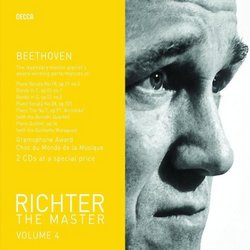A response and a review
Sean J. O'Neill | Ashland, VA | 01/13/2008
(5 out of 5 stars)
"First, the response to the reviewer below: this new series is missing about one CD's worth of Schumann recordings (when compared to the 1994 "Authorised Recordings" collection). The *two* new discs, then, comprise Vol. 11 ("20th Century Music").
And second... the review. My goodness, where to begin? This set is chock-full of magnificent Beethoven performances. Of the two all-Beethoven releases in this new "Richter - The Master" series, this is the one to own. The first was full of performances that were trumped by other Richter recordings that are readily available from other souces; that is certainly not the case with this 2-CD set.
The performance of the Sonata No. 18 is absolutely spectacular. For those who have Richter's recording from Prague (the earliest recorded Richter performance of this sonata), you'll notice the same rock-solid structure in the broad elements of his interpretation when compared to the present recording (the last of the live Richter recordings). Somehow, though, this later one conveys even more beauty and musical coherence, if not the same greased-lightning speed in the second and fourth movements; it's as though the intervening 27 years only improved his already-spectacular vision of this powerful, lovely, and clever sonata.
In Richter's hands, works usually taken for granted - such as the two Rondos - come off as fresh, fascinating pieces that are packed with music that is worthy of our attention [in listening to this new series, I am constantly reminded of the fact that Richter had an uncanny knack for taking pieces perceived as "lesser works" and turning them into polished gems]. The chamber music performances are likewise excellent, and Richter's contribution in each is as good as it gets. As an ensemble performance, the Perlman-Harrell-Ashkenazy recording of the "Archduke" might still be in a league of its own, but if you love this trio, you owe it to yourself to hear Richter's shot at the attention-grabbing piano part.
Finally, a suggestion to all lovers of great music: take the time to turn off the lights, sit in a comfortable chair, and listen to the present recording of the A major sonata. All of the qualities that make Richter, when he's on form, the best Beethoven pianist of the last half-century are on display here: the flawless structure, the lovely and imaginative phrasing, the limitless strength (used when appropriate, held in reserve when not; the dynamic range here is exactly what Beethoven called for, and Richter's tone in his later years was never "clangy," even in fortissimo passages). It all adds up to a quintessentially *musical* performance that belongs right up there among the performers' pantheon of Schnabel, Solomon, Kempff... and yes, Richard Goode, who earns mention alongside these legends via his excellent performances of the late Beethoven sonatas (though perhaps not in any other realm). It may sound blasphemous to some, but Richter might be considered to outshine every last one of them when it comes to performing the music of The Master.
20-25 bucks for performances of this quality? Worth every penny."
Beautiful, wise Beethoven from Richter in his later phase
Santa Fe Listener | Santa Fe, NM USA | 06/06/2009
(5 out of 5 stars)
"Pilips' bargain two-fers in their "Richter, The Master) series are reissues of material that is highly inconsistent. Richter lived a long time, and his later recordings are often not at the peak of technique or vigor. One must pick and choose, since Philips didn't hit the pianist in his prime. Happily, this second volume of Beethoven recordings is better than most, and it gives us a few treasurable performances, albeit lacking in the fiery temperament that was the younger Richter's hallmark.
First I'd list the "Archduke" Trio with members of the Borodin Quartet, familiar partners with Richter in a range of chamber music. The two string players are a bit too relaxed, but Richter dominates with quiet, authoritative assurance. This isn't the most vigorous Archduke you'll ever hear -- it's surprisingly soft-grained and romantic -- but the pianism holds your attention from first note to last, and the recorded sound is exemplary, bringing out the gorgeous, resiny tone of the cello in particular. Tempos are broad throughout, with a notably slow finale. (For more trills, Istomin-Stern-Rose are my first choice.)
I agree with the previous reviewer's opinion that Richter was the dominant Beethoven interpreter of the last fifty years. Here, his sonata readings are "autumnal" and full of musical wisdom. The "Hunt" sonata Op. 31 no. 3 could hardly be more buoyant and good-natured, yet it also preserves the underlying strength that always marked Richter's Beethoven sonata readings, not to mention its still-invigorating rhythm.
Richter's style is considerably more Mozartean in the two Rondos, pieces he loved and played often. The previous reviewer says that Richter wasn't clangy in his later playing, but this Op. 101 exhibits some pretty bangy attacks in the second movement. your reaction to it will depend, I think, on whether you consider Richter's earlier versions over the top in their intensity. for me, he's a bit square in the first movement this time around, and the piano sound is stiff. The softer music lacks mystery. But, then, I cam comparing Richter to Richter. The quality of his playing is undeniable.
Of least interest is the last work on CD 2, the Wind Quintet Op. 16 that Beethoven modeled on a great predecessor by Mozart. Richter is slightly under par, the sound from a live concert is muffled and colorless, and there's not much vivacity in the tempos or the mood, either."


 Track Listings (10) - Disc #1
Track Listings (10) - Disc #1